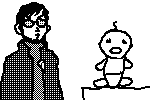|
Re: Japanese Learners Club ^.^
|
|
Would it be proper to use the ã‚” character as a Hiragana "vu" (if there ever was such a use for such a thing?) Its in UTF-8, and IME can convert to it.. but is there a use for vu in Hiragana? ã‚”ã ゔムゔ ゔ㇠ゔ㉠|
|
Re: Japanese Learners Club ^.^
|
|
Normally ビ is used to compensate for the lack of the "v" one doesn't hear in Japanese phonetics. Of course, there are some times where ヴィ is used. |
|
Re: Japanese Learners Club ^.^
|
|
a stranger dropping by for a little question~ a simple one, but i've been curious about it... about writing the alphabet V in katakana. "vi" for example. Do you write it by 「ビã€ã€€or 「ヴィã€ï¼Ÿ Is there any difference between those two? |
|
Re: Japanese Learners Club ^.^
Link |
by
 on 2008-01-03 18:31:07 (edited 2008-01-03 18:34:19)
on 2008-01-03 18:31:07 (edited 2008-01-03 18:34:19)
|
|
yay navarr-san tnx for that...!!! ryt ryt the 1st 3 steps worked but haha i need the cd to install sum stuff ;p wel wel il look for it now.. anyways tnk u so much MelloBoy-san: haha yes but i dont hev the cd atm ;pp anyways tnx too 

 |
|
Re: Japanese Learners Club ^.^
|
|
If you have a windowsXP or vista or 2000 CD, you can install Japanese fonts on your computer. For XP Start -> Control Panel -> Regional and Language Options Goto "Languages" tab, and checkmark the "Install files for East Asian Languages" box and follow the on-screen instructions. Further, if you want to be able to type Japanese, click on "Details" in the "Text services and input languages" section in the same screen. This will open a new window. In the bottom half of the window, click on "Add" which will open another window. From here I'm a little fuzzy, but I believe you select Japanese from the pull-down menu, then click OK and Japanese should now be in the previous window. You can actually remove 'English" if you want at this point, then reboot. To switch between Japanese/English, the key command is Alt+ ` (that tilde key next to the 1). Hope this helps. |
|
Re: Japanese Learners Club ^.^
|
|
Instead, why don't you enable Eastern Asian Characters? I assume you're using Windows: To do such a thing, follow This Guide. |
|
Re: Japanese Learners Club ^.^
Link |
by
 on 2008-01-03 18:18:41
on 2008-01-03 18:18:41 |
|
i wana learn how to write japanese too but my pc cant read them... i mean japanese characters r displayed as ???... yes only question marks appear... i dont hev the program that can read japanese characters ='( so pls put some romaji/s too... 

 |
|
Re: Japanese Learners Club ^.^
|
|
Wow, nice. Thx again to mamoru san and gstephe san. Are you guys from japan? Those sentences are at least at level 2 or above. |
|
Re: Japanese Learners Club ^.^
|
|
『僕ã¨çµå©šã—ãŸãŒã£ã¦ãŸã¨æ€ã£ãŸã€‚ I thought you wanted to marry with me.〠ã“ã®æ–‡ç« ã¯ã¡ã‚‡ã†å¤§åˆ‡ã€‚覚ãˆã¦ã»ã†ã¯ã„ã„。ãŸã„ã¦ã„毎月ãらã„ã“ã†ã„ã†ãªè¡¨ç¾ã‚’使ã£ã¦ã„る。(笑ã„) åã‚’ã¨ã£ã¦ã€ã“ã“ã‚を割れる |
|
Re: Japanese Learners Club ^.^
|
|
é–“é•ãˆãªã‹ã£ãŸã‚‰ã€å›ã¯å¦æ ¡ã«è¡ŒããŸãŒã£ã¦ã„ã‚‹ã‚“ã˜ã‚ƒãªã„ã‹ã€‚ If I'm not mistaken, you want to go school isn't it? ã‚‚ã—ã‹ã—ã¦ã‚ã‚“ãªæ‰€ã«ä½ã¿ãŸãŒã£ã¦ã„ã‚‹ã‚“ã§ã™ã€‚ Probably he/she wants to stay at that kind of place. 僕ã¨çµå©šã—ãŸãŒã£ã¦ãŸã¨æ€ã£ãŸã€‚ I thought you wanted to marry with me. 店ã«å¸½åãŒæ¬²ã—ãŒã£ã¦ã„るらã—ã„。 It seems to me that you want that hat in the store.
æ„›ã•ã‚ŒãŸã„
|
|
Re: Japanese Learners Club ^.^
|
|
Love you two so much. Thx for the great help....Can somebody plz give me a few example of sentences using tagatte... Really want to learn this from the pros. :) |
|
Re: Japanese Learners Club ^.^
|
|
@stephe 守るも猫ãŒå«Œã„ã£ï¼
æ„›ã•ã‚ŒãŸã„
|
|
Re: Japanese Learners Club ^.^
|
|
Taken from WWWJDIC: 見ãˆã‚‹ ã€ã¿ãˆã‚‹ã€‘ (v1,vi) (1) to be seen; to be in sight; (2) to look; to seem; to appear; (3) (hon) to come; (P); EP |
|
Re: Japanese Learners Club ^.^
|
|
Sorry I wasn't more clear. "ã‚ã‚‹"and their forms generally aren't used for pets. When you're trying to indicate posession with pets, the proper word to use is "飼ã†". When you're trying to indicate presence of a pet, "ã„ã‚‹" and its forms are appropriate. So, for "I have a cat": instead of "ç§ã¯çŒ«ãŒã‚ã‚‹" it would actually be "ç§ã¯çŒ«ã‚’飼ã£ã¦ã‚‹" For something like "I have a cat at home" "ç§ã®å®¶ã«çŒ«ãŒã„ã¾ã™" Or "Look, there's a cat over there" "ã‚ã£ã€ãã“ã«çŒ«ãŒã„る。" "神様ãŒç§ã‚’見る。" could also be translated as "God watches me" Sorry if I'm going off on a tangent lol "Haguchi Ga Kirai Desu" the use of [wa][ga][wo] comes naturally but when it comes to explaining it, it's pretty tough...I take it for granted :P In many cases, [wa][ga] can actually be used (and is used) interchangably. It's bad grammar but... So here goes, as I try to explain this: [ãŒ]is a æ ¼åŠ©è©ž(ã‹ãã˜ã‚‡ã—) Great so what the hell is this? Kakujyoshi establishes the relationship between the noun or pronoun and the respective phrase/incomplete sentence/fragment. [ã¯]is a 副助詞(ãµãã˜ã‚‡ã—) So what the hell is a fukujyoshi? If i recall properly, fukujyoshi connects various words (not necessarily a noun or pronoun) and 文節(ã¶ã‚“ã›ã¤) to put a limitation to interpretation. so let's take 2 examples: 彼女ã¯å¤§å¦ç”Ÿã§ã™ 彼女ãŒå¤§å¦ç”Ÿã§ã™ [ã¯]would be "She is a college student" [ãŒ]would be "She is the college student" i hope this clarifies things a little bit more, though admittedly, Japanese grammar is very different from English, so I'm sure there's a huge possibility that you're lost or that it sounds like i'm contradicting myself :/ Here's another example i guess: 昨日ã¯å¤§å¤‰ã ã£ãŸ 昨日i don't think is considered a noun in the Japanese language in most cases so it's not common to use [ãŒ]. So, it would be translated as "Yesterday was tough" However, if you want to say something like "Yesterday was THE tough day" then you would use [ãŒ]. ok...i'm gonna stop before i dig myself into a hole :/ -------------- gstephe wrote: Melloboy, I thought ç§ã¯è¦‹ã‚‰ã‚Œã‚‹ã€‚was I can see. Whats the difference between that and: ç§ã¯è¦‹ãˆã‚‹ã€‚ ------------- 見られるis more or less "being seen". 見ãˆã‚‹is more or less "to see" |
|
Re: Japanese Learners Club ^.^
|
|
ã¯ã€€ãŒã€€ã‚’ ç§ã¯çŠ¬ã‚’è²·ã„ã¾ã—ãŸã€‚ ã‚ãŸã—ã¯ã„ã¬ã‚’ã‹ã„ã¾ã—ãŸã€‚ watashi WA(ha) inu wo kaimashita ç§ãŒçŠ¬ã‚’è²·ã„ã¾ã—ãŸã€‚ ã‚ãŸã—ãŒã„ã¬ã‚’ã‹ã„ã¾ã—ãŸã€‚ watashi GA inu wo kaimashita. (猫ãŒå¤§å«Œã„。猫を大好ã人ã«ã€ã”ã‚ã‚“ã(ãã—ã¦ã€çŠ¬ã®æ¼¢å—ã®ã»ã†ã¯èªã¿ã‚„ã™ã„) WA is used for the main idea of the sentence. The thing that is important. I(important) bought the dog(not so important) (I) would go on to say how (I) saved up a lot of money and (I) researched a lot about dogs and (I) have to walk it everyday. GA is used for secondary subjects. I bought the DOG It was this type of (DOG). the (DOG) weighs this much. (HE) is so happy. There's probably more it than that, but this is how i think of WA and GA. (oh and I hate cats. to anyone who loves them, sorry. also, dog is an easier kanji to read.) Melloboy, I thought ç§ã¯è¦‹ã‚‰ã‚Œã‚‹ã€‚was I can see. Whats the difference between that and: ç§ã¯è¦‹ãˆã‚‹ã€‚ |
|
Re: Japanese Learners Club ^.^
|
|
Nyaa Nyaa~ I'm not thinking too much today. Its been the longest time since I've been able to study Japanese. French is getting to me. I see what you're saying. ç§ã®çŒ«ã¯ã©ã“ã§ã™ã‹ã€‚ ------------------------------- [EDIT] Okay, Now I'm confused as to the whole [ha] [ga] thing, as in Episode 22 of Deathnote, Misa-chan says click here for spoiler but.. shouldn't that be [wa] from what we've discussed here? |
|
Re: Japanese Learners Club ^.^
|
|
"ç§ã‚’見る。" you can translate this as I will be watched too : D just that the sentence misses the "thing" that is going to watch you. 神様ãŒç§ã‚’見る。---> god will look at me
æ„›ã•ã‚ŒãŸã„
|
|
Re: Japanese Learners Club ^.^
Link |
by
|
|
That sentence reads something like: "As for me, the cat is alive", with the implication that for other people, the cat is not alive. Schrodinger's cat comes to mind. If what you wish to say is, "I am a cat", you would simply say, "ç§ã¯çŒ«ã§ã™". If, on the other hand, you want to say, "It is my cat", you would say, "ç§ã®çŒ«ã§ã™". To say, "The cat exists", you would say, "猫ãŒã„ã¾ã™". 


|
|
Re: Japanese Learners Club ^.^
|
|
Yeah, I wasn't really focusing, or I would've remembered that, Imasu is the correct form for living creatures. I was just quickly trying to throw together an example for [ha][ga][wo] ç§ã¯çŒ«ãŒã„ã¾ã™ã€‚ Should also be acceptable, no? |
|
Re: Japanese Learners Club ^.^
|
|
Len-chan wrote: ç§ã‚’見る。[I will be watched] I think this means that I will look (見 literally means eye but since it was made to a verb, it will be to look.) ç§ã‚’見る。[I will be watched] this means I will look or am looking.. i just don't know the japanese form of the verb in its present progressive form (the -ing form). --------------------- ç§ã¯è¦‹ã‚‰ã‚Œã¦ã„ã¾ã™ã€‚[I am being watched] - present ç§ã¯è¦‹ã‚‰ã‚Œã¾ã—ãŸã€‚[I was watched/seen] - past ç§ã¯è¦‹ã‚‰ã‚Œã¾ã™ã€‚[I will be watched/seen] - future also, splitting hairs but for pets, you usually don't use the word "ã‚ã‚‹". ç§ã¯çŒ«ãŒã‚ã‚Šã¾ã™ã€‚ would actually be ç§ã¯çŒ«ã‚’飼(ã‹)ã£ã¦ã„ã¾ã™ã€‚ the inflection for ownership is downwards, whereas the inflection for buying is upwards. cheers |
